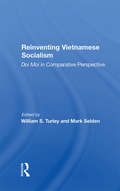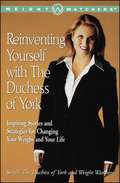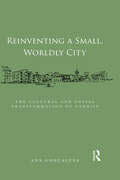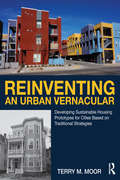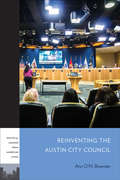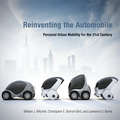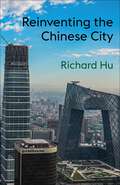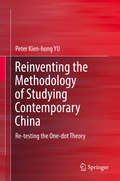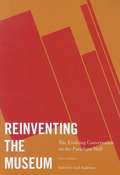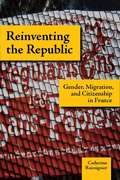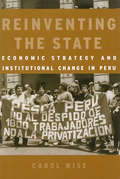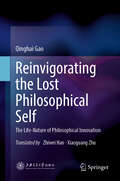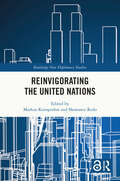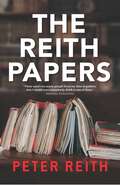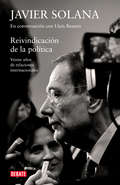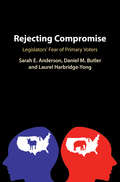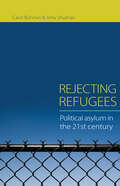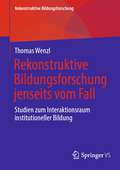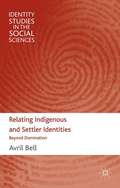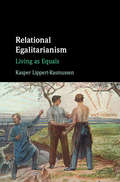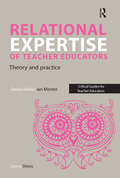- Table View
- List View
Reinventing Vietnamese Socialism: Doi Moi In Comparative Perspective
by Mark Selden William S TurleyThis book presents a variety of disciplinary and theoretical perspectives on the problematic of reform in Vietnam. It explores the Vietnam's reforms in relation to those taking place in other countries of the socialist world, comparing doi moi with restructuring in other socialist states.
Reinventing World War II: Popular Memory in the Rise of the Ethnonationalist State (RSA Series in Transdisciplinary Rhetoric)
by Barbara A. BieseckerBy the 1970s, World War II had all but disappeared from US popular culture. But beginning in the mid-eighties it reemerged with a vengeance, and for nearly fifteen years World War II was ubiquitous across US popular and political culture. In this book, Barbara A. Biesecker explores the prestige and rhetorical power of the “Good War,” revealing how it was retooled to restore a new kind of social equilibrium to the United States.Biesecker analyzes prominent cases of World War II remembrance, including the canceled exhibit of the Enola Gay at the National Air and Space Museum in 1995 and its replacement, Steven Spielberg’s Saving Private Ryan, Tom Brokaw’s The Greatest Generation, and the United States Holocaust Memorial Museum. Situating these popular memory texts within the culture and history wars of the day and the broader framework of US political and economic life, Biesecker argues that, with the notable exception of the Holocaust Memorial Museum, these reinventions of the Good War worked rhetorically to restore a strong sense of national identity and belonging fitted to the neoliberal nationalist agenda.By tracing the links between the popular retooling of World War II and the national state fantasy, and by putting the lessons of Foucault, Derrida, Lacan, and their successors to work for a rhetorical-political analysis of the present, Biesecker not only explains the emergence and strength of the MAGA movement but also calls attention to the power of public memory to shape and contest ethnonational identity today. This book will interest rhetoricians and historians as well as students and scholars in the fields of US politics and communication studies.
Reinventing Yourself with The Duchess of York: Inspiring Stories and Strategies for Changing Your Weight and Your Life
by Weight Watchers Sarah, The Duchess of YorkAre you ready to change your life? Join Sarah, The Duchess of York on an inspiring journey to help you rediscover -- and achieve -- your true goals.Today, The Duchess of York is a confident, single working mother of two girls. But, as most of the world knows, that wasn't always the case. Once targeted by the international press, The Duchess has learned one of life's great lessons: how to uncover what you want out of life and get it. She reveals how the ups and downs of her life -- including her divorce, her financial problems, and the deaths of those close to her -- have made her a stronger, wiser person and a better mother.In the first chapter, "Transforming My Life," The Duchess explores how, when and why she decided to take charge and reinvent her life. In the chapters that follow, readers will discover how they, too, can change their own lives. The book provides a series of self-assessment quizzes and questionnaires, as well as concrete steps you can take to initiate change. Throughout, The Duchess offers her insights, including how each chapter topic relates to her life and what she has learned from others.Reinventing Yourself with The Duchess of York supplies a blueprint for action for anyone seeking to change her life. In an easy-to-follow format, the book provides concrete information and advice on how to use an eight-step plan to achieve your goals -- whether it's losing weight, getting fit, or simply improving your health. Reinventing Yourself also explains how to apply the plan to other areas of life, including changing careers, starting over after divorce, and more.To help inspire you toward your goals, Reinventing Yourself also includes heartwarming and motivating profiles of women who have redefined their lives: Weight Watchers Leaders, real women who have lost weight and transformed their lives in countless ways. In interviews with The Duchess and profiles throughout, these women explore how to make the best of your circumstances, live a happier, healthier life, and change your destiny.
Reinventing a Small, Worldly City: The Cultural and Social Transformation of Cardiff
by Ana GonçalvesFocusing on Cardiff, the capital city of Wales in the UK, this book reflects on a contemporary small European city – its development, characteristics, and present struggles. Following a century in which it was dubbed the world’s ‘coaltropolis’, the decline in demand for coal meant that Cardiff endured an acute process of de-industrialisation. In seeking to address this and the related high levels of unemployment, it has experienced a process of cultural and social reinvention since the 1980s, and more significantly after Wales turned into a devolved nation in the late 1990s. Cardiff’s development from a small port into a capital city is examined and special attention is paid to the city’s cultural and social transformation in recent decades that has relied on the expansion of specific cultural clusters and tourism, which have been decisive for the transformation of its cultural identity and in shaping the city’s individual and collective memories and identities. Cardiff epitomises a quintessential case of urban reinvention, cultural regeneration, and social transformation, lying between two apparently contradictory paradigms: the need to respond to global demands and the effort to maintain its cultural distinctiveness and Welsh roots. Therefore, it sets the scene for a wider reflection on small cities, especially in the European setting, and what generally characterises these cities: their liveability, cultural creativity and community empowerment, as well as the fact that they facilitate mobility and social interaction. These worldly cities, the book contends, present interesting opportunities and challenges at the urban, economic, social and cultural levels that rely on more human-scale, people-based approaches to cities, thus defying existing urban hierarchies and categorisations.
Reinventing an Urban Vernacular: Developing Sustainable Housing Prototypes for Cities Based on Traditional Strategies
by Terry MoorWith increasing population and its associated demand on our limited resources, we need to rethink our current strategies for construction of multifamily buildings in urban areas. Reinventing an Urban Vernacular addresses these new demands for smaller and more efficient housing units adapted to local climate. In order to find solutions and to promote better urban communities with an overall environmentally responsible lifestyle, this book examines a wide variety of vernacular building precedents, as they relate to the unique characteristics and demands of six distinctly different regions of the United States. Terry Moor addresses the unique landscape, climate, physical, and social development by analyzing vernacular precedents, and proposing new suggestions for modern needs and expectations. Written for students and architects, planners, and urban designers, Reinventing an Urban Vernacular marries the urban vernacular with ongoing sustainability efforts to produce a unique solution to the housing needs of the changing urban environment.
Reinventing the Austin City Council (PLAC: Political Lessons from American Cities)
by Ann O'M. BowmanUntil recently, Austin, the progressive, politically liberal capital of Texas, elected its city council using a not-so-progressive system. Candidates competed citywide for seats, and voters could cast ballots for as many candidates as there were seats up for election. However, this approach disadvantages the representation of geographically-concentrated minority groups, thereby—among other things—preventing the benefits of growth from reaching all of the city’s communities. Reinventing the Austin City Council explores the puzzle that was Austin’s reluctance to alter its at-large system and establish a geographically-based, single-member district system. Ann Bowman chronicles the repeated attempts to change the system, the eventual decision to do so, and the consequences of that change. In the process, she explores the many twists and turns that occurred in Austin as it struggled to design a fair system of representation. Reinventing the Austin City Council assesses the impact of the new district system since its inception in 2014. Austin’s experience ultimately offers a political lesson for creating institutional change.
Reinventing the Automobile: Personal Urban Mobility for the 21st Century (The\mit Press Ser.)
by William J. Mitchell Chris E. Borroni-Bird Lawrence D. BurnsHow to leave behind our unwieldy, gas-guzzling, carbon dioxide–emitting vehicles for cars that are green, smart, connected, and fun. This book provides a long-overdue vision for a new automobile era. The cars we drive today follow the same underlying design principles as the Model Ts of a hundred years ago and the tail-finned sedans of fifty years ago. In the twenty-first century, cars are still made for twentieth-century purposes. They are inefficient for providing personal mobility within cities—where most of the world's people now live. In this pathbreaking book, William Mitchell and two industry experts reimagine the automobile, describing vehicles of the near future that are green, smart, connected, and fun to drive. They roll out four big ideas that will make this both feasible and timely.The fundamental reinvention of the automobile won't be easy, but it is an urgent necessity—to make urban mobility more convenient and sustainable, to make cities more livable, and to help bring the automobile industry out of crisis.
Reinventing the Chinese City
by Richard HuSince the late 1970s, China has undergone perhaps the most sweeping process of urbanization ever witnessed. This is typically understood as a story of growth, encompassing rapid development and economic dynamism alongside environmental degradation and social dislocation. However, over the past decade, China’s leaders have claimed that the country’s urbanization has entered a new stage that prioritizes “quality.” What does China’s new urban vision entail, and what does the future hold in store?Richard Hu unpacks recent trends in urban planning and development to explore the making and imagining of the contemporary Chinese city. He focuses on three key concepts—the “green revolution,” “smart city movement,” and “great innovation leap forward”—that have become increasingly influential. Through case studies of Beijing, Hangzhou, and Hefei, Hu analyzes how attempts to achieve greater sustainability, promote data-driven governance, and foster innovation have fared on the ground. He also considers the experimental city Xiong’an in terms of China’s idealized vision of the urban future and investigates how the recent experiences of Hong Kong relate to regional and national development projects.Reinventing the Chinese City provides a careful accounting of the ideas that have dominated urban policy in China since 2010, emphasizing key continuities underlying claims of novelty. Shedding light on the transformations of the Chinese city, this book offers a new perspective on the factors that will shape the trajectory of urbanization in the coming decades.
Reinventing the Left in the Global South
by Richard SandbrookThis book offers a fresh appraisal of the nature and significance of the democratic Left in the Global South. The moral and intellectual leadership of the Left is shifting south from its European birthplace. It is in the Global South, most notably in Latin America, that one finds newly self-confident progressive movements. This 'new' democratic Left includes parties and social movements that not only are avoiding the familiar pitfalls that ensnared socialists and social democrats in the twentieth century, but also are coping with the realities of the twenty-first century, especially neoliberal globalization. In analyzing and illustrating three innovative strategies - moderate social democracy, radical social-democratic transition to socialism, and Left populism - this study nudges the debate about the Left out of the well-worn grooves into which it has fallen in recent decades.
Reinventing the Methodology of Studying Contemporary China
by Peter Kien-hong YuThis book illustrates how the one-dot theory, which is a dialectical study, is well suited to describing, explaining and inferring contemporary China's past, present and future. It argues that since October 1949, the field of contemporary China studies has been dominated by modified and abandoned non-dialectical theories and models. It also challenges selected non-dialectical theories and models which were first generated in the West, such as the game theory and rational (choice) theory. With its emphasis on methodology, the book offers a valuable resource for academics, researchers and practitioners alike with an interest in logically, systematically and coherently unraveling Taiwan's and mainland China's contemporary politics and international relations.
Reinventing the Museum: The Evolving Conversation on the Paradigm Shift
by Gail AndersonReinventing the Museum: The Evolving Conversation on the Paradigm Shift offers 44 seminal articles representing the changing perspectives about the role of museums in contemporary times. The book includes iconic pieces from the 20th century and presents the latest thinking of the past decade. The book begins with foundational writings that provide a thorough history of museum thought and theory. With this context established, Anderson presents articles that trace the emerging ideas in 21st-century museum studies on public engagement, frameworks, and leadership. In conjunction with introductory material and recommended additional readings, these articles will help students grasp the leading ideas and the essentials of the dialogue taking place in the museum field.
Reinventing the Republic
by Catherine RaissiguierEarly one morning in 1996, the sanctuary of a Parisian church was suddenly disrupted by a police raid. A group of undocumented immigrant families had taken refuge in the church under threat of deportation due to the French state's increasingly restrictive immigration policies. Rather than disperse and hide, thesesans-papiers-people literally without papers- came together to bring to light the deep contradictions in the French state's immigration policies and practices. Reinventing the Republicchronicles the struggle of thesans-papiersto become rights-bearing citizens, and links different social movements to reveal the many ways in which concepts of citizenship and nationality intersect with debates over gender, sexuality, and immigration. Drawing on in-depth interviews and a variety of texts, this disquieting book provides new insights into how exclusion and discrimination operate and influence each other in the world today.
Reinventing the State: Economic Strategy and Institutional Change in Peru
by Carol WiseThe political economic history of Latin America in the post-World War II era has largely been one of underachievement and opportunities lost. This all changed with the wave of market reforms that were implemented in the 1990s. However, the precise role of these reforms as an agent of change is still hotly debated. This in-depth analysis of the Peruvian case argues for an explanation that treats institutional innovation and state reconstruction as necessary conditions for the apparent success of the market in Latin America. Exploring how state intervention has been both the cause of Latin America's economic downfall in the 1980s and the solution to its recovery, Reinventing the State analyzes three main phases of state intervention: the developmentalism that lasted until 1982, the state in retreat of the 1980s, and the streamlined state of the 1990s. Through a comprehensive examination of the Peruvian experience, the book explains the country's impressive turnaround from the standpoint of institutional modernization and internal state reform. Written for a broad academic audience, the public-policy community, and the private sector, this book is also meant as a quick primer for any journalist, consultant, or private-sector analyst in need of an overview of the region's market-reform effort and how it has played out in Peru.
Reinvigorating the Lost Philosophical Self: The Life-Nature of Philosophical Innovation
by Qinghai GaoThis book not only presents Gao’s major philosophical views and background but also reflects “our” self-consciousness and zeitgeist. Reinvigorating the Lost Philosophical Self is the last major published work by Qinghai Gao. The three parts of the book are organized around the themes of “traditional reality and philosophy”, “philosophy and innovation” and “man and philosophy”, respectively. The book does not only provide a philosophical standpoint but also broaden the horizon on which the Chinese turn to themselves, to the times and to the world. Presently, under the context of the Covid pandemic, trade war, regional conflicts and economic slowdown, there is an increasing risk of disruption to people’s lives. The book sheds some light on where we are going. Coming from a Chinese philosopher, Reinvigorating the Lost Philosophical Self is concerned with our destiny, reflects our hardships and attempts to provide answers to our questions.
Reinvigorating the United Nations (Routledge New Diplomacy Studies)
by Sławomir Redo Markus KornprobstThis book examines pathways for how to reinvigorate the United Nations, in light of recent crises.The United Nations requires reinvigoration. The organisation’s supply of global governance falls short of global demand in areas ranging from health to environment, while intra-state armed conflicts are on the rise again, and fullblown inter-state war has returned to the agenda. At the same time, decision-making mechanisms are deadlocked, and their legitimacy is increasingly questioned. But what pathways are there for reinvigorating the United Nations? This book argues for consolidating key principles pertaining to inter-state relations and human rights, for elaborating on the UN system in order to avoid fragmentation and make it possible for it to keep pace with a changing world, and for revisiting UN decision-making structures so that it can become more inclusive and rebuild trust among stakeholders. The volume embraces a comprehensive approach to studying the organisation, and the authors analyse the institutions comprising the UN system, as well as the social context within which actors put these institutions to use. The book contributes to scholarly debates about the United Nations and about how it is embedded in a broader international order currently beset by crises and, ultimately, aims to show what concrete steps for strengthening the organisation might look like.This book will be of much interest to students of international organisations, diplomacy studies, global governance, and International Relations in general.The Introduction, Chapter 5, Chapter 10 and the Conclusion of this book is available for free in PDF format as Open Access from the individual product page at www.routledge.com. It has been made available under a Creative Commons Attribution-Non Commercial 4.0 International License. Chapter 7 of this book is available for free in PDF format as Open Access from the individual product page at www.routledge.com. It has been made available under a Creative Commons Attribution-Non Commercial-NoDerivs 4.0 International License.
Reith Papers
by Peter ReithPeter Reith was a senior cabinet minister under John Howard from 1996 to 2001. He was the face of the government's tough waterfront reforms and architect of sweeping industrial laws, a major contributor to the Fightback policy, a potential leader of the Liberal Party, a key player in the introduction of the GST, an influential republican in the 1999 referendum and Minister for Defence during the time that it was wrongly claimed that asylum seekers had thrown their children overboard.A relentless diary keeper, Peter Reith kept extensive records of those tumultuous years in over a hundred notebooks he filled with recollections of conversations with his colleagues, discussions in cabinet and his private views and predictions.The Reith Papers is the best of those diary entries from the heart of a government that changed Australia.
Reivindicación de la política
by Javier Solana Lluís BassetsLa política no es una mera gestión, no es administración, es mucho más que eso. Es que la gente te entienda y que sepa adónde vas. La política tiene que ser pedagogía y tiene que ser liderazgo. En parte es hacer presente el futuro, y para eso hay que tener una visión del futuro.
Reivindicación de la política: Veinte años de relaciones internacionales
by Javier Solana Lluís BassetUn repaso a los retos del mundo actual a partir de la experiencia de 15 años en primera fila de la política internacional de Javier Solana. «Yo creo en la política... La política no es mera gestión, no es administración, es mucho más que eso. Es que la gente te entienda y que sepa adónde vas. La política tiene que ser pedagogía y tiene que ser liderazgo. En parte es hacer presente el futuro, y para eso hay que tener una visión del futuro.»Javier Solana Desde que en 1995 fuera nombrado secretario general de la OTAN, Javier Solana ha pasado quince años en primera fila de la política internacional. Han sido quince años repletos de acontecimientos: la disolución de la antigua Yugoslavia, la decadencia de Rusia, el auge de China, la aparición del terrorismo islámico, los años de Clinton, de Bush y la llegada de Obama, la expansión de la OTAN y de la Unión Europea, la globalización, la mayor crisis económica desde 1929... Gracias a su experiencia y en muchas ocasiones a su presencia en las cumbres y reuniones que definieron momentos históricos, Solana presenta, guiado por las inteligentes preguntas de un periodista de prestigio como es Lluís Bassets, un fascinante panorama del mundo actual, los retos a los que nos enfrentamos y cómo se hizo la transición del mundo estable de la guerra fría a las incertidumbres del actual. Dos ideas y un principio vertebran el libro: Occidente se ha impuesto a costa de perder poder frente a las potencias emergentes, como Brasil, China o la India; Europa se empezó justificando como reconciliación tras la guerra, luego estabilización tras la caída del Muro, pero ahora se fundamenta en la necesidad para no pasar a la irrelevancia. Y el principio es la inquebrantable fe en la política como la manera de conciliar intereses, alcanzar objetivos y evitar conflictos. Un libro esencial, plagado de anécdotas y de retratos de primera mano, por el español más importante en la escena internacional de los últimos tiempos.
Rejecting Compromise: Legislators' Fear of Primary Voters
by Daniel M. Butler Sarah E. Anderson Laurel Harbridge-YongLegislative solutions to pressing problems like balancing the budget, climate change, and poverty usually require compromise. Yet national, state, and local legislators often reject compromise proposals that would move policy in their preferred direction. Why do legislators reject such agreements? This engaging and relevant investigation into how politicians think reveals that legislators refuse compromise - and exacerbate gridlock - because they fear punishment from voters in primary elections. Prioritizing these electoral interests can lead lawmakers to act in ways that hurt their policy interests and also overlook the broader electorate's preferences by representing only a subset of voters with rigid positions. With their solution-oriented approach, Anderson, Butler, and Harbridge-Yong demonstrate that improving the likelihood of legislative compromise may require moving negotiations outside of the public spotlight. Highlighting key electoral motives underlying polarization, this book is an excellent resource for scholars and students studying Congress, American politics, public policy, and political behavior.
Rejecting Refugees: Political Asylum in the 21st Century
by Amy Shuman Carol BohmerMany nations recognize the moral and legal obligation to accept people fleeing from persecution, but political asylum applicants in the twenty-first century face restrictive policies and cumbersome procedures. So, what counts as persecution? How do applicants translate their stories of suffering and trauma into a narrative acceptable to the immigration officials? How can asylum officials weed out the fake from the genuine without resorting to inappropriate cultural definitions of behaviour? Using both in depth accounts by asylum applicants and interviews with lawyers and others involved, this book takes the reader on a journey through the process of applying for asylum in both the United States and Great Britain. It describes how the systems address the conflicting needs of the state to protect their citizens from terrorists and the influx of hordes of unwelcome economic migrants, while at the same time adhering to their legal, moral and treaty obligations to provide safe haven for those fleeing persecution. Rejecting Refugees is an insightful and fresh evaluation of the obstacles asylum applicants face and the cultural, procedural, and political discrepancies in the political asylum process. This makes it ideal reading to students and scholars of political science, international relations, sociology, law and anthropology.
Rekonstruktive Bildungsforschung jenseits vom Fall: Studien zum Interaktionsraum institutioneller Bildung (Rekonstruktive Bildungsforschung #33)
by Thomas WenzlGegenstand der rekonstruktiven Bildungsforschung sind klassischerweise individuelle Fälle. Mit diesem empirischen Fokus geht das Generalisierungsproblem einher, dass das Allgemeine im Besonderen aufgespürt werden muss. Allzu leicht verheddern sich Studien jedoch in der Individuation ihrer Fälle, ohne zu generalisierbaren theoretischen Aussagen, die über die Bildung von Realtypen hinausgehen, zu gelangen. Vor diesem Problemhorizont wird in dem Buch ein alternativer empirischer Zugriff vorgestellt, der für soziale Praxen typische, aber fallunspezifische Sprechakte ins Zentrum rückt. Durch die Analyse eines solchen Datenmaterials, so zeigt der Autor, kann der oftmals prekäre Generalisierungsanspruch der rekonstruktiven Bildungsforschung verlässlicher eingelöst werden. In verschiedenen Einzelstudien zum Interaktionsraum institutioneller Bildung in Schule und Universität wird dieser methodische Vorschlag elaboriert und material fundiert.
Relaciones Internacionales: Un Manual Sobre: Conceptos Básicos y Problemas Globales
by Shahid Hussain RajaEste libro contiene 20 ensayos extensos, cada uno de los cuales trata sobre una de las cuestiones globales contemporáneas en varios campos. Los resúmenes de los 20 ensayos son los siguientes Capítulo 2- Globalización: compresión del tiempo y el espacio: la globalización es un fenómeno multifacético que representa la creciente integración de la economía, las comunicaciones y la cultura a través de las fronteras nacionales. Se habla mucho pero es un concepto controvertido; no hay consenso sobre su contexto, causalidad, dirección e impacto. Este ensayo examina este complejo tema desde diferentes perspectivas: la historia, los desafíos que plantea y cómo responder a ellos. En este proceso, he dividido la historia de la globalización en cinco fases, tomando cinco inventos cruciales de la humanidad como la esencia de esa época, así como la fuerza impulsora de la globalización, tales como: el fuego, la rueda, la imprenta, el vapor e Internet, respectivamente. Puede utilizar este marco para estudiar la historia global. Capítulo 3 a 6: Ideas que dan forma al mundo: los siguientes cuatro ensayos tratan sobre las ideas que han sido el centro de controversia durante décadas. En cada época de la historia hay uno o más intelectuales visionarios que se vuelven instrumentales, con sus teorías sobre el futuro, en la conformación de las percepciones de los formadores de opinión en las potencias mundiales dominantes. Las acciones tomadas por estos líderes mundiales dan forma al curso de la historia. En los tiempos modernos, hay varios nombres, pero hemos seleccionado cuatro que, en nuestra opinión, han jugado un papel muy importante en este aspecto. Ellos son George F. Kennon, Francis Fukuyama, Samuel P Huntington y Robert D. Kaplan. Estos cuatro ensayos resumen el contenido de los artículos que escribieron y cómo influyeron en la política mundial. Cada ensayo termina con su respectiva crítica. Capítulo 7- Terrorismo global: desafíos y respuesta: El te
Relating Indigenous and Settler Identities
by Avril BellThis book uses identity theories to explore the struggles of indigenous peoples against the domination of the settler imaginary in Australia, Canada, New Zealand and the United States. The book argues that a new relational imaginary can revolutionize the way settler peoples think about and relate to indigenous difference.
Relational Egalitarianism: Living as Equals
by Kasper Lippert-RasmussenOver the last twenty years, many political philosophers have rejected the idea that justice is fundamentally about distribution. Rather, justice is about social relations, and the so-called distributive paradigm should be replaced by a new relational paradigm. Kasper Lippert-Rasmussen seeks to describe, refine, and assess these thoughts and to propose a comprehensive form of egalitarianism which includes central elements from both relational and distributive paradigms. He shows why many of the challenges that luck egalitarianism faces reappear, once we try to specify relational egalitarianism more fully. His discussion advances understanding of the nature of the relational ideal, and introduces new conceptual tools for understanding it and for exploring the important question of why it is desirable in the first place to relate as equals. Even severe critics of the distributive understanding of justice will find that this book casts important new light on the ideal to which they subscribe.
Relational Expertise of Teacher Educators: Theory and Practice (Critical Guides for Teacher Educators)
by Lorna ShiresA valuable text for teacher educators, including ECT mentors in schools, on the topic of relational expertise. It provides a critical analysis of current conceptions of the role of teacher educator and a theoretical basis for practice.This book provides a concise and clear cultural-historical perspective of the expertise of teacher educators. The theoretical framework of relational expertise draws upon what matters to both the teacher educator and beginning teacher as they work together on the complex problem of learning to teach. It provides a clear basis for their practice and for what happens in their practice, signalling a way of understanding how to undertake the role of teacher educator in terms of the professional learning of the beginning teacher. Concepts explored include relational expertise, relational agency, common knowledge, the double move, metacommentary, and second order practice, offering a critique of the deconstruction of the act of teaching into bite-size chunks to be memorised. Opportunities for critical reflection are also provided throughout the book, which speaks to teacher educators directly in terms of suggesting a clear theoretical basis for their expertise and how to enact this in practice.
